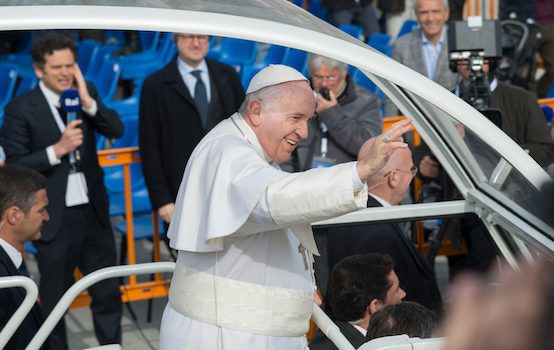Pope Francis Rides Into Ireland’s Culture War

The visit of Pope Francis to Ireland this weekend, taking place as the Church contends with a global sexual abuse scandal, will highlight not only the rapid and apparently precipitous decline of Irish Catholicism but also the changing conditions of religious politics on the island.
Francis will arrive almost exactly three months after a referendum allowed the Irish constitution to permit wider access to abortion. The decisive result in this contest—with Donegal the only county in the Republic that favored the continued legislative privileging of Catholic social teaching—has exposed new lines of division on the island. Thirty years after the end of the Northern Ireland Troubles and after 18 months without devolved government at Stormont and protracted conversations about reunification, the cleavages between north and south are also running through definitions of marriage and the right to life. On both sides of the border, the question of Christian influence on society has become an issue in a new culture war.
This new politics of morality offers some surprising examples of how the older sectarian dynamic might be transcended. During the last several elections in Northern Ireland, Catholic bishops have instructed the faithful to use their votes to support those parties upholding the Church’s teaching on marriage and the sanctity of life. In practice, this has been problematic for many nationalist and republican voters, whose traditional electoral options, Sinn Fein and the Social Democratic and Labour Party (SDLP), have in the last five years moved away from any uncomplicated defense of Catholic morality. Sometimes they’ve even openly opposed Church teachings, as in the case of SDLP support for same-sex marriage and Sinn Fein’s campaigning for abortion rights. Now there is some evidence that voters who remain loyal to their bishops are contemplating what was previously unthinkable. The brother of a Bloody Sunday victim who now votes for the hardline Traditional Unionist Voice (TUV) because of its unhesitating opposition to abortion may not be the anomaly that the media imagines. Sinn Fein, meanwhile, has consolidated progressive views on social questions alongside its older arguments about the border.
In Northern Ireland, there is no longer an uncomplicated overlay of political and religious identities—and political nationalism seems increasingly at variance with Catholic social mores. The new disjunction between the politics of the border and morality is evident in the way Northern Ireland’s Protestant churches and unionist political parties responded to the papal visit. In Dublin, Pope Francis will be welcomed by southern politicians who campaigned to erode the legislative influence of his church. The leaders of the unionist parties of the north, meanwhile, will not meet with him, despite his having more in common with them on social issues. This hesitation isn’t shared by Northern Ireland’s leading Protestant churchmen, many of whom have encouraged the pope to visit the north. The moderator of the Presbyterian Church in Ireland, the leader of the largest Protestant denomination on the island, will travel to Dublin to attend a reception in Francis’s honor.
It’s hard to exaggerate the significance of this meeting. Until the mid-1980s, ministers of the Presbyterian Church in Ireland were required to believe that the pope was the antichrist. But in the aftermath of the Troubles and amidst sudden secularization, old enemies have become new friends. This year’s General Assembly, the ruling body of the Presbyterian Church in Ireland, voted overwhelmingly to support the first meeting between a Presbyterian leader and a pope on Irish soil. The Assembly made this decision as it voted to impose sacramental restrictions upon members in same-sex relationships and cut its ties with its mother church, the Church of Scotland, which has been moving towards formalizing its support for same-sex marriage. The softening of Presbyterian attitudes towards the Roman Catholic Church reflects its hardening position against more liberal Protestants. It will further enable the construction of alliances that cut across the older jurisdictional and denominational boundaries—alliances that will underpin a new moral conservatism in Ireland’s new culture wars.
Of course, it is possible that Pope Francis may not be the ally that his evangelical admirers suppose him to be. After all, the pontiff will arrive in Ireland shortly after signaling his willingness to implement significant doctrinal changes. Earlier this month, he revised the Church’s catechism to change its view on capital punishment. This action was seized upon by a former president of Ireland, Mary McAleese, who has argued that further doctrinal changes might follow, including to the Church’s “evil” prohibition of homosexuality. The revision represents a complex pastoral problem as much as it does an interesting political possibility. Northern Ireland’s Catholic bishops have already had to witness the traditional leaders of the nationalist community turning away from the Church’s teaching on social issues. How will they encourage the faithful if the Vatican itself can no longer be relied upon?
In Northern Ireland, politicians have yet to catch up with the rapprochement between conservative Catholics and Protestants, whose increasingly unity on issues of morality remains without cross-community political representation. The current alignment isn’t working, in part because parties are organized around the issue of the border while voters are increasingly interested in other things. Pope Francis’s visit will be marked by the usual sales of commemorative holy hardware. But the most enduring of these papal products might be the new alliances in Ireland’s old holy wars.
Crawford Gribben is a professor of history at Queen’s University Belfast. You can find him on Twitter at @GribbenC.
Comments